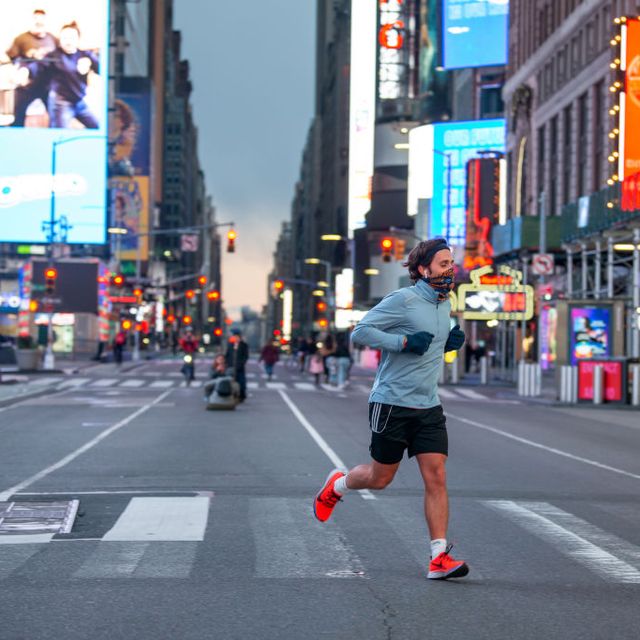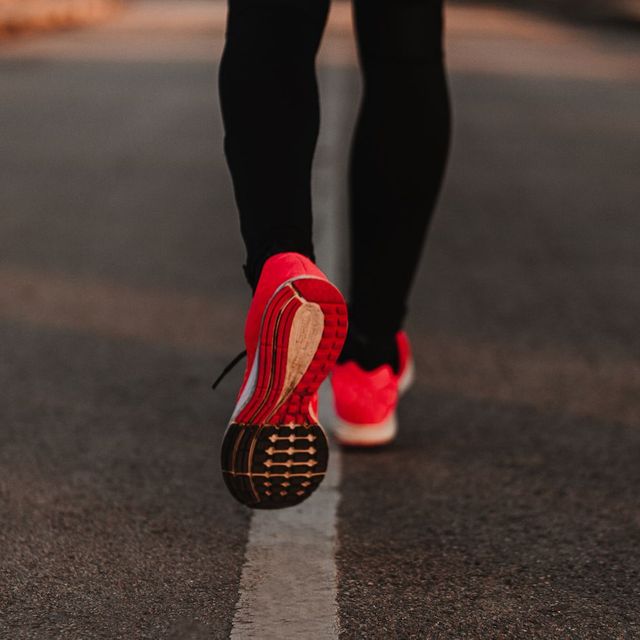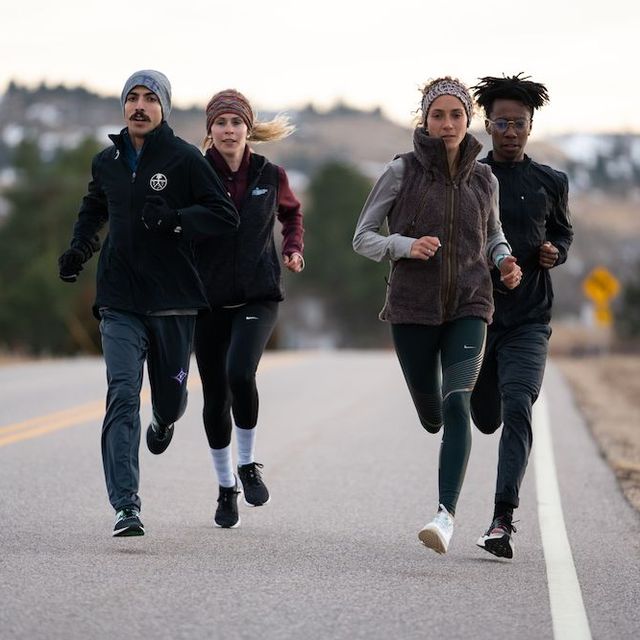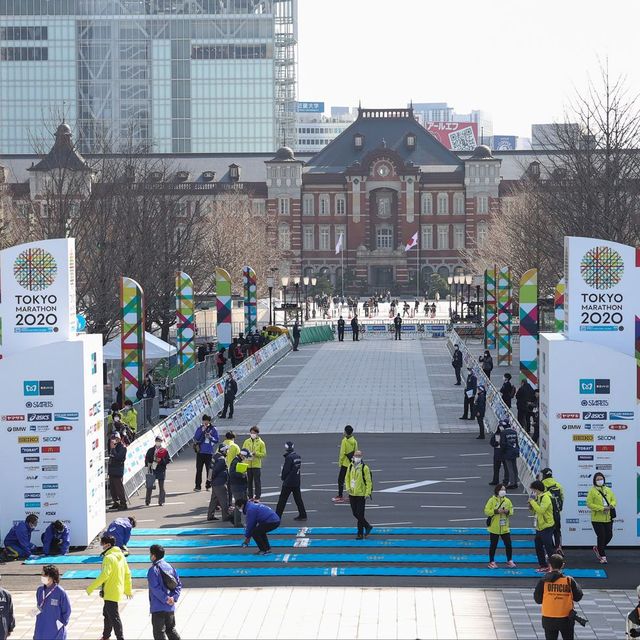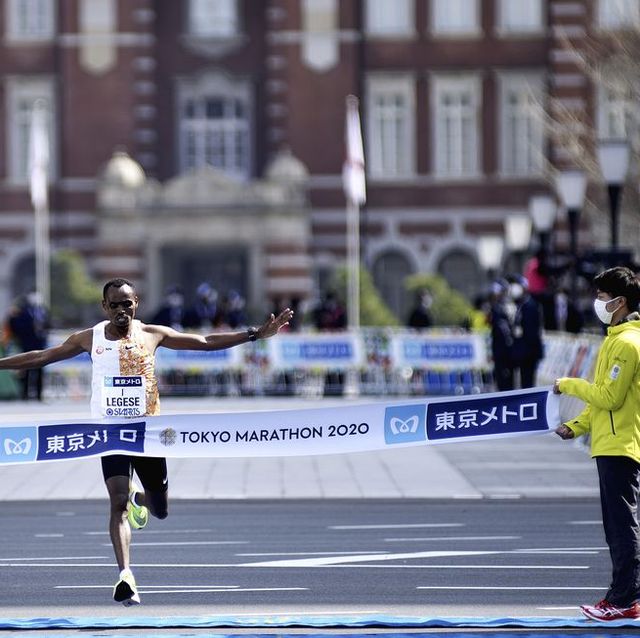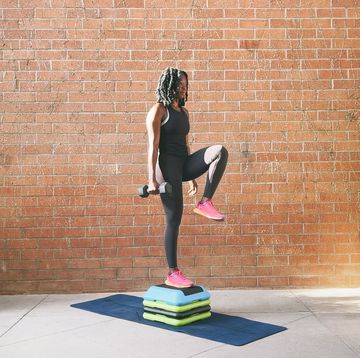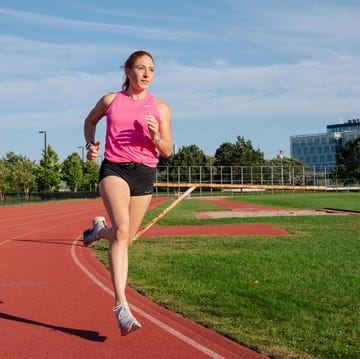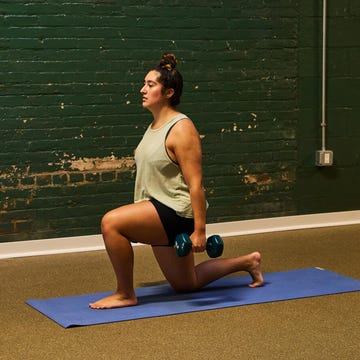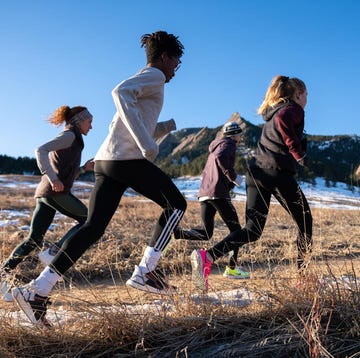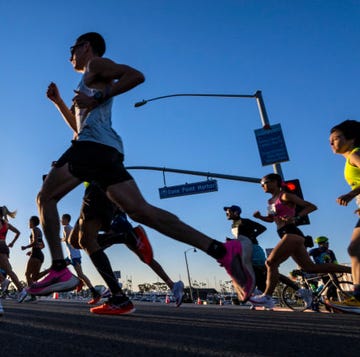Two months ago, Leigh Power was in the midst of training for her next race, the Vancouver Half Marathon on May 3. Just a few weeks later, her plans were thwarted when race organizers canceled the event—the weekend’s festivities also featured marathon and 8K races—due to the coronavirus pandemic. Around the same time, Power, 38, was furloughed from her job in the events industry, and suddenly, her daily routines were thrown to the wayside.
Without a race on the horizon, she re-evaluated her goals. Of course, competition was a major motivator, but her main intention for staying active is overall health. While Vancouver is under stay-home orders, she re-tooled her maintenance plan, focusing on virtual fitness classes and solo runs, but soon found the miles didn’t come as easily as they used to. “There’s good days and there’s bad days,” she says. “It does feel harder, a lot of the runs feel more challenging. It’s an overall sense of fatigue. I wonder why it feels so hard and why it hurts so much and why it doesn’t feel as good as I think it should.”
As cities around the world are continuing lockdowns and social distancing, solitary running has become an escape from the monotony of life under quarantine. Despite the cancelation or postponement of races, many of us are embracing the extra time ordinarily spent commuting or socializing to run and get creative with workouts, no doubt contributing to positive mental wellbeing during a fraught time. Still, the added stressors brought on by the pandemic—concern for the health of ourselves and loved ones, social isolation, economic instability, lack of childcare—may impede physical performance and contribute to a sense of lethargy during runs.
Mental fatigue, or exhaustion caused by a brain on overdrive, can have negative effects on our physical performance, research shows. A 2014 study found that prolonged mental stress increased the amount of perceived energy it took to work out, fatigue, and soreness for up to four days. Meaning: Not only will your run feel harder, but you’ll also feel slightly more taxed than usual afterward, too.
Another study, also from 2014, showed that runners who were mentally exhausted ran slower than if they were not. In a review of scientific research, the authors concluded that stress can have a negative effect on physical activity performance. The main consequence of mental stress on performance is the amount of perceived effort needed to complete the task, studies show.
During this current health crisis, our brains are experiencing both short-term and long-term stressors, says Bart Roelands, Ph.D., a sports science professor at Vrije Universiteit Brussel who’s studied mental fatigue and exercise. The transition to a virtual lifestyle means near-constant exposure to screens and fewer breaks in the monotony—like a quick walk to grab coffee—which contributes to mental fatigue on a short-term, everyday basis. The loss of a loved one, a job, and increased social isolation adds to long-term stress. Taken together, the mental load can affect our motivation and endurance, making our runs feel harder.
“Just being locked up on its own is enough of a trigger to feel bad,” Roelands says. “At the same time, if you lose your job or … [are] not being able to visit your father who’s in a nursing home, that contributes to how you feel mentally and that is going to diminish your drive and motivation to exercise. If you have enough motivation left, you’re still going to go for that run, but it makes sense that it’s going to feel harder.”
Detroit-based marathoner Nathan Walker, who was also set to run the Vancouver Marathon in early May, quickly noticed a shift in the difficulty of his runs in late March when Michiganders were ordered to stay inside. In the days leading up to the shutdown, Walker, 43, was averaging 45-mile weeks with 13- to-16-mile long runs and ramping up his training. Now, the music publicist says he’s lucky if he can maintain a slower pace for 8 miles.
“Instantly overnight, the longest I could do is 8—and even that sounds so exhausting and time consuming even though I have nothing but time,” Walker says. “Oh god, how am I going to go on a two-hour run? I have dishes to do.”
Adding the stress of the pandemic to the already volatile political climate has only compounded Walker’s mental load, he says. For now, he can’t predict a time when he’ll enjoy the prospect of running again beyond as an excuse to get out of the house.
For many others, the fear of potentially losing their jobs takes a serious toll, as well. That’s the case for Rick Wilson, a Santa Monica-based marathoner who works in sales. “Business is way down. I’m feeling huge pressure: Am I going to keep my job?” he says. “It makes it harder to get past that first mile—when you’re running, and you go let me just get past the first mile—sometimes that first mile has taken me five miles to get to.”
While he’s maintained his workout frequency, running six days a week, Wilson, 61, finds himself cutting his runs short more often than he would’ve when there was a marathon on the horizon—which, ordinarily, is every two months.
At the start of the year, Tori Bachan’s training goals were primarily recovery-driven. After she was hit by a car two-and-a-half years ago, Bachan, 28, had just begun to train, completing a 31-day spin challenge in January and easing back into running in March. She’d logged two weeks of recovery miles before the pandemic reached Brooklyn, where she lives, and found herself relegated to her apartment, struggling to sleep and growing increasingly despondent.
After a few weeks of strict quarantine, Bachan, who works as a talent manager, started running again, wearing a mask, and found the physical impediment just as restricting as the mental load. Her runs typically max out at 1.5 miles. “When I try to run, my body just can’t perform the way it is used to,” she says. “It’s probably the lack of sleep; my head’s in a million places; I can’t breathe with the mask. My mind isn’t slowing down so it’s not allowing me to be calm.”
Roelands, the sports scientist, says the cause of acute, short-term stress on physical performance is unknown and hasn’t been widely studied. However, research indicates long-term stress can contribute to diminished performance and burnout, causing an athlete to feel fatigued and disinterested.
While the process of reopening local communities varies geographically, we all have to cope with the realities of a new normal. To curb any newfound pandemic lethargy, Roelands recommends getting out for a run first thing in the morning before the stress of the news or work can tire your brain, try to stay active throughout the day—getting up to stand, move, and walk around a bit evert hour or so—and maintain a healthy diet.
What’s helped Leigh Power was to create a semblance of community; she joined a virtual running group in April. Knowing there were other runners out there, somewhere, challenging themselves with the same interval training and long runs helped spark her motivation, a welcome morale boost in a time of obstacles.
“It's still hard to get out the door and do the workouts,” Power says, “but seeing other people, cheering them on virtually did get me through the month of April.”
